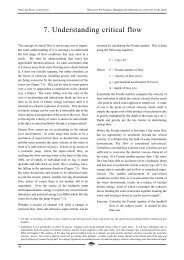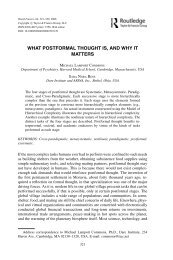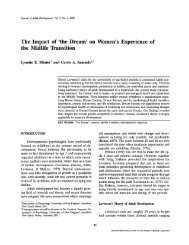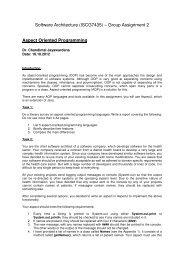Moral Development and Moral Education: An Overview
Moral Development and Moral Education: An Overview
Moral Development and Moral Education: An Overview
You also want an ePaper? Increase the reach of your titles
YUMPU automatically turns print PDFs into web optimized ePapers that Google loves.
equality. <strong>An</strong>other way to look at these differences is to view these two moralities as providing two<br />
distinct injunctions - the injunction not to treat others unfairly (justice) <strong>and</strong> the injunction not to turn<br />
away from someone in need (care). She presents these moralities as distinct, although potentially<br />
connected.<br />
In her initial work, Gilligan emphasized the gender differences thought to be associated with<br />
these two orientations. The morality of care emphasizes interconnectedness <strong>and</strong> presumably<br />
emerges to a greater degree in girls owing to their early connection in identity formation with their<br />
mothers. The morality of justice, on the other h<strong>and</strong>, is said to emerge within the context of<br />
coordinating the interactions of autonomous individuals. A moral orientation based on justice was<br />
proposed as more prevalent among boys because their attachment relations with the mother, <strong>and</strong><br />
subsequent masculine identity formation entailed that boys separate from that relationship <strong>and</strong><br />
individuate from the mother. For boys, this separation also heightens their awareness of the<br />
difference in power relations between themselves <strong>and</strong> the adult, <strong>and</strong> hence engenders an intense<br />
set of concerns over inequalities. Girls, however, because of their continued attachment to their<br />
mothers, are not as keenly aware of such inequalities, <strong>and</strong> are, hence, less concerned with fairness<br />
as an issue. Further research has suggested, however, that moral reasoning does not follow the<br />
distinct gender lines which Gilligan originally reported. The preponderance of evidence is that both<br />
males <strong>and</strong> females reason based on justice <strong>and</strong> care. While this gender debate is unsettled, Gilligan's<br />
work has contributed to an increased awareness that care is an integral component of moral<br />
reasoning.<br />
<strong>Education</strong>al approaches based on Gilligan's work have emphasized efforts to foster empathy<br />
<strong>and</strong> care responses in students. Perhaps the most comprehensive treatment of these issues may be<br />
found in Nel Noddings book, "The challenge to care in schools" New York: Teachers College Press,<br />
1992.<br />
VII. Conclusion<br />
This segment was designed to provide an overview of the major developmental theories currently<br />
influencing research on moral education. To remain current with new information <strong>and</strong> approaches in<br />
this very active field you should check this WEB site on a regular basis for ARTICLES OF THE<br />
MONTH. To learn about available books in the field check the RECENT BOOKS segment (currently<br />
under construction). For persons wanting to learn more about traditional character education please<br />
check the RELATED WEB SITES icon.<br />
This overview was prepared by Mary Elizabeth Murray, Department of Psychology, University if<br />
Illinois at Chicago. Comments or inquiries for further information should be directed to PROFESSOR<br />
LARRY NUCCI, University of Illinois at Chicago.<br />
Selected References<br />
Gilligan, C. (1982). In a different voice: Psychological theory <strong>and</strong> women's development. Harvard<br />
University Press: Cambridge.<br />
Kohlberg, L. & Turiel, E. (1971). <strong>Moral</strong> development <strong>and</strong> moral education. In G. Lesser, ed.<br />
Psychology <strong>and</strong> educational practice. Scott Foresman.<br />
Piaget, J. (1965). The moral judgment of the child. The Free Press: New York. Power, F. C., Higgins,<br />
A., & Kohlberg, L. (1989). "Lawrence Kohlberg's Approach to <strong>Moral</strong> <strong>Education</strong>." New York:<br />
Columbia University Press.<br />
Smetana, J. G. (1996, in press). "Parenting <strong>and</strong> the development of social<br />
knowledgereconceptualized: A social domain analysis." To appear in J.E. Grusec &<br />
L.Kuczynski (Eds.), H<strong>and</strong>book of parenting <strong>and</strong> the transmission of values. NewYork: Wiley.<br />
Turiel, E. (1983). "The <strong>Development</strong> of Social Knowledge: <strong>Moral</strong>ity & Convention." New York:<br />
Cambridge University Press.
















